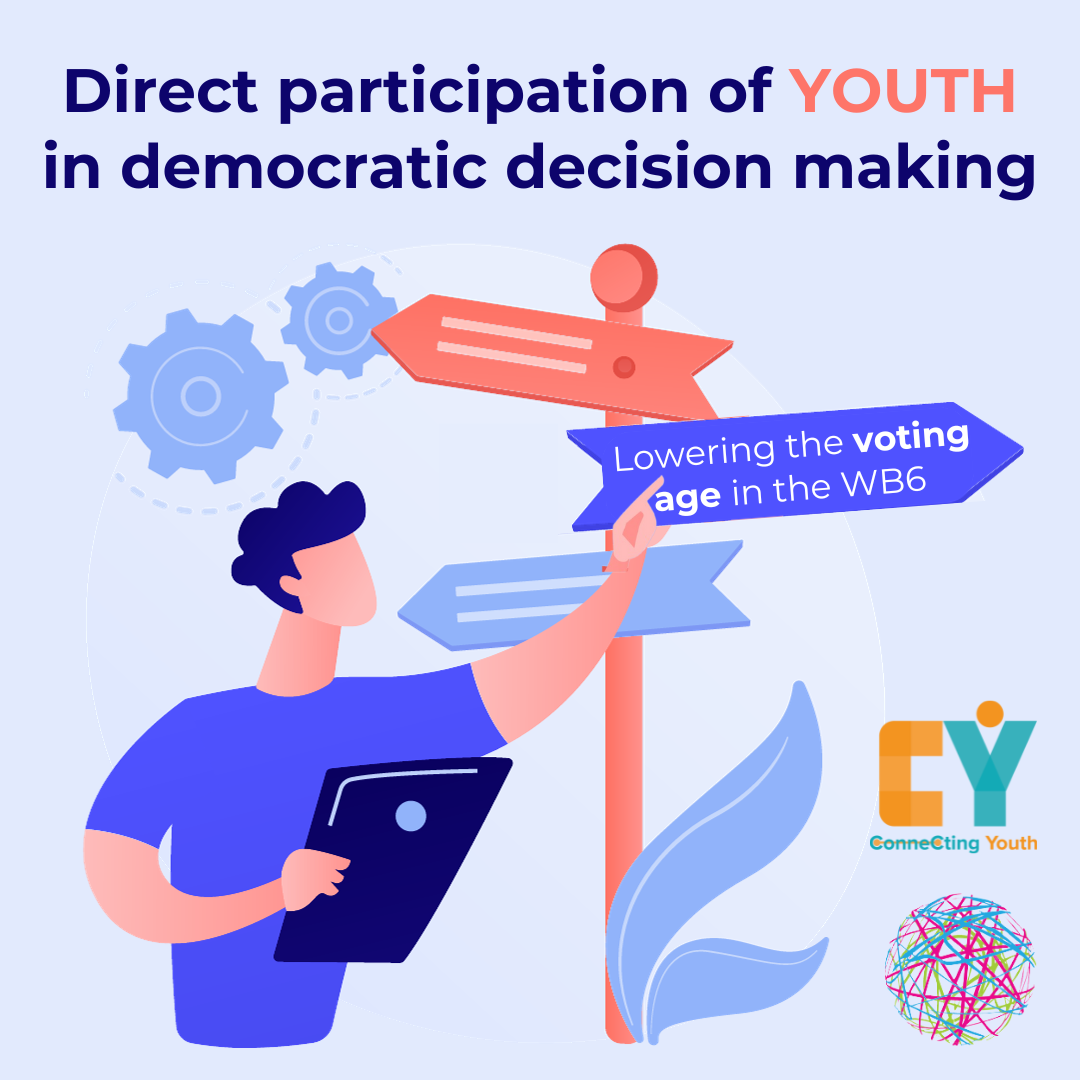24.10.2023

How old is old enough to vote?
In various regions, young individuals find themselves navigating a paradoxical landscape where they shoulder adult responsibilities such as taxation, employment, and can be prosecuted in court, and yet their democratic rights remain a subject of contention. This has led to discussions around granting them the same voting rights as adults, aligning with the historical trajectory of lowering the voting age.
The age at which individuals are considered old enough to vote varies from country to country. In the majority of European countries, the voting age is typically set at 18 years old, allowing young adults to participate in the electoral process and have a say in shaping their country's future. However, the countries of the Western Balkan have different age requirements that are differently regulated internally, i.e. some of them regulate the voting age in the Constitution, and some of them in the Electoral Law. Through meticulous population data, unique youth proportions are revealed in the Western Balkan countries - Albania, Bosnia and Herzegovina, Kosovo, Montenegro, North Macedonia, and Serbia.
In Albania, youth (15-29 years) account for 25.2% of a 2.8 million population according to the 2011 census. Bosnia and Herzegovina sees 21.4% youth (15-30 years) among its residents as per the last 2013 census, while Kosovo proudly holds the highest population of young people (15-24 years) in Europe at around 19.4% (2013 census), while, according to World Factbook, this number is higher (16.95%). Montenegro's 2011 census indicates 21.4% of the population are youth (15-29 years) among 620,029 inhabitants, while North Macedonia's census shows a shift from 24% (2001) to 18% (2021) for ages 15-29. Serbia's 2022 census reflects approximately 15.08% young people, defined as 15-29 years.
In all of the six Western Balkans countries, the voting age is set at 18. In Albania, In Kosovo, North Macedonia and Serbia, voting age is regulated within the constitution, whereas in BiH and Montenegro, according to the Election Law.
The question of lowering the voting age to 16 has come up more frequently in recent years in the European Parliament. Several countries have chosen to reduce the voting age for municipal and regional elections from 18 to 16, despite the fact that most Council of Europe members still require an 18-year-old minimum age for one to become a voter.
However, conflicting viewpoints persist, sparking intense debates in numerous countries. Despite this growing momentum, it is important to state the arguments against the lowering of the voting age. They include the lack of interest and knowledge, the possibility of low participation and the possibility of bad quality of the voter’s choice. Deciding whether to reduce the voting age to 16 involves a complex evaluation that extends beyond a single determinant. This discourse encompasses various political, legal, and societal aspects. Considerations encompass factors like potential impacts on voter participation rates and constitutional or normative justifications, necessitating careful examination when addressing the idea of granting voting rights at 16. Diverse perspectives prevail not only among the general populace and policymakers but also within academic circles, leading to a lack of unanimous consensus on the matter. The issue is more than complex. It intertwines with the constitutional and normative arguments in the countries. For one to make a change in the voting age, for instance, in one of the WB countries, it is necessary to open the constitution and amend the article which gives the right to its citizens to vote at the particular age. Тhis change itself might led towards contradiction with the law of labor relations and with the legal capacity of the person.
Indeed, very much interesting is that, at first, many believe that 16-year-olds are too young to make responsible and educated voting decisions, that they won't cast ballots, or that they would simply vote according to what their parents say or do. However, this is a complete presumption which is unfounded according to research14 conducted by the Center for Information & Research on Civic Learning and Engagement at Tufts College - and the local governments generally should not be prevented from granting 16-year-olds the right to vote based on their assumption that they are “incapable” of making informed choices. Here, we question the fairness argument - how can one be considered as being capable of driving, working, and paying taxes, but considered not capable of making responsible choices for voting? When unable to vote until turning 18, some citizens won’t have a chance to vote for their mayor or president until they are almost 22.
Consider the contrast between 18-year-olds who have never voted and 16-year-olds who have. As time progresses, the 18-year-olds who didn't vote are more likely to perpetuate their habit of non-participation, becoming 50-year-olds with limited involvement in elections. On the other hand, the 16-year-olds who embraced their voting rights are more likely to continue casting their votes as they grow older, maintaining a strong connection to the democratic process. By extending voting rights to 16-year-olds, we are essentially capitalizing on their openness to engagement and building a generation of active citizens. The logic behind this statement lies in the concept of habit formation and the continuity of civic engagement over time. It suggests that individuals who engage in voting at a younger age are more likely to develop a habit of civic participation, which tends to persist as they grow older.15 Conversely, those who abstain from voting early in life may carry that habit of non-participation into their later years. This argument emphasizes that allowing young people to vote can lead towards benefits to the electoral body, lasting impact on their civic behavior and the overall health of a democratic society.
The discourse surrounding the lowering of the voting age in the Western Balkans reveals a complex and nuanced landscape. The truth is that tangible progress in this direction remains elusive. The region finds itself grappling with multifaceted challenges, from ongoing internal and bilateral disputes to the overarching preoccupation with the EU enlargement process. Amidst these pressing concerns, the question of lowering the voting age appears to be overshadowed and relegated to the sidelines, struggling to find a prominent place on the agenda.
While the idea holds potential, the readiness of Western Balkan countries to enact such a change appears limited due to the absence of a coherent and concrete plan to implement and regulate such a transition, even at the local level. Frankly, occasional instances of action emerge. For instance, in 2021, North Macedonia's youth wing of the Liberal-Democratic Party (LDP)16 held a conference focused on advocating for a reduction in the age limit to 16 and the extension of voting rights. This was a call for all parties, harnessing the power of their young constituents, to contemplate and support such an initiative that would empower 16-year-olds to have a say in shaping the country's future. Moreover, In the midst of this inertia, Albania, for instance, has embarked on a notable endeavor by launching a petition to lower the voting age, with an attempt to engage various stakeholders, inviting young individuals, parents, educators, parliamentarians, ministers, and public officials to partake in the discourse.
Nonetheless, the larger WB regional perspective conveys a sense of ambivalence. While a categorical "no" to the initiative isn't explicitly articulated, the broader sentiment suggests that a resounding "yes" might not be imminent in the near future. The intricacies, challenges, and competing priorities faced by the Western Balkans make a swift and unequivocal adoption of the vote@16 concept a formidable prospect. As the region grapples with the complexities of its current reality, it becomes apparent that while the idea of lowering the voting age holds potential, its journey towards realization is marred by a series of obstacles. Balancing the aspirations of youth empowerment with the multifaceted dynamics of the region, the path ahead remains uncertain, navigating a delicate balance between aspiration and feasibility.
Last but not least, for a vote at 16 to have an actual impact, especially in the Western Balkans, focusing on strong civic education is crucial. Firstly, the civic education as such should move from being a tokenistic endeavor - considered just as a mere high school subject, to a transformative process. Ideally, integrating political education as a dedicated high school subject could amplify the impact. Without a robust educational framework that equips young individuals with the knowledge and tools to critically analyze political dynamics, the act of lowering the voting age could risk falling short of its desired impact.

Iva is a Program Assistant at the National Youth Council of Macedonia, who joined the team at the beginning of 2023. She is a 22 year old young woman studying Political Science at the Faculty of Law “Iustinianus Primus” in Skopje. She is a former Youth Delegate from the Macedonian delegation to the Council of Europe - Congress of Local and Regional Authorities and currently a Young European Ambassador as part of the WeBalkans, the EU Regional Communication Programme for the Western Balkans (DG NEAR). She possesses a comprehensive understanding of the myriad complexities of the democratic processes and has dedication towards fostering a prosperous future for the Western Balkans.